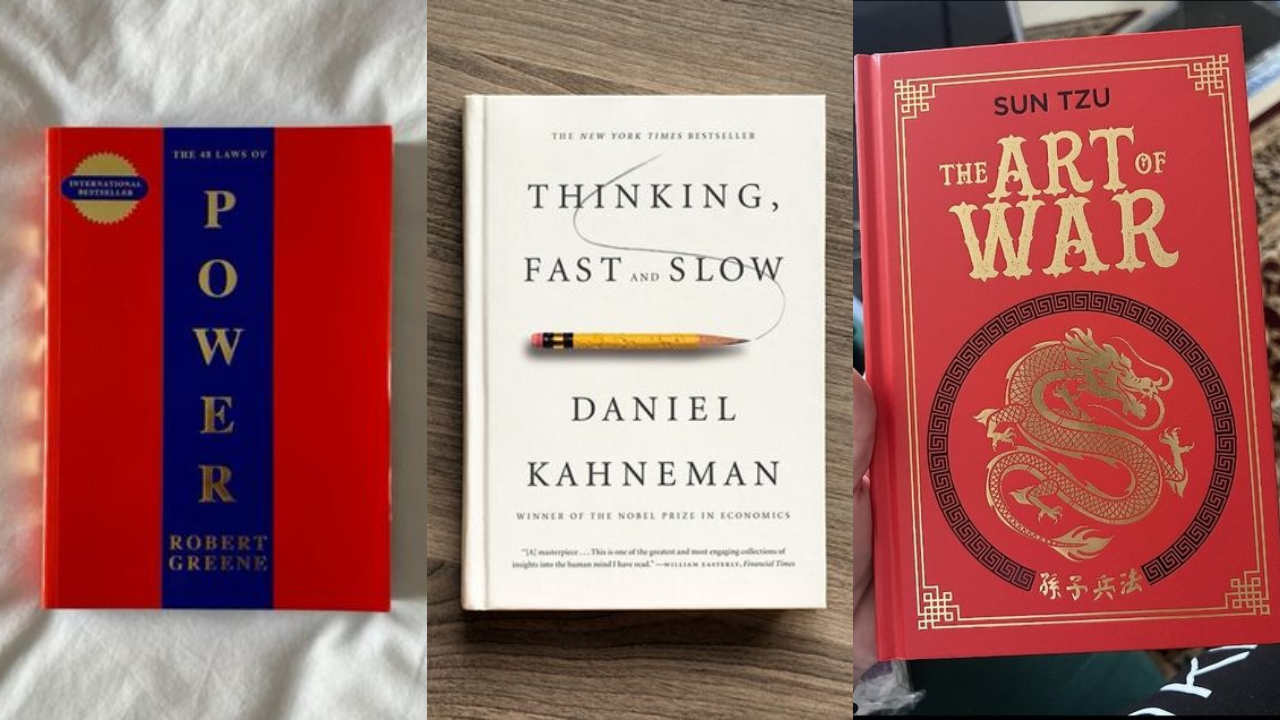Books to read if you like the laws of human nature (Image credit: Instagram)
Robert Greene’s The Laws of Human Nature delves into the complexities of human behavior and explores our deepest motivations, desires, and instincts. If you found the book insightful, fascinating, or even life-changing, here’s a list of eight other books that offer equally profound insights into human nature, power dynamics, and psychology.
1. Thinking Fast and Slow by Daniel Kahneman
In this groundbreaking book, Nobel laureate Daniel Kahneman explores the two systems of thinking that drive our decisions: fast, intuitive thinking and slow, deliberate thinking. Thinking, Fast and Slow highlights the cognitive biases and errors in judgment that influence human behavior, in line with Greene’s focus on understanding the hidden forces that shape our thoughts and actions. It is a must-read for anyone interested in human psychology and decision-making processes. We often make decisions based on mental shortcuts, which can lead us to make irrational decisions. Understanding these biases can help you make more informed decisions.
2. Robert Greene’s 48 Laws of Power
If you enjoyed The Laws of Human Nature, you’ll probably find The 48 Laws of Power equally interesting. Another masterpiece from Greene, this book delves into the principles of power, manipulation, and strategy. Greene presents historical examples and practical perspectives, making this book a practical guide for anyone looking to navigate power dynamics in their personal or professional life. Power dynamics are present in every aspect of life, and mastering the subtle art of influence can help you thrive in any situation.
3. Sapiens: A Brief History of Humankind by Yuval Noah Harari
In Sapiens, Harari takes readers on a journey through human history, examining how cognitive, agricultural, and scientific revolutions have shaped modern human behavior. This book offers a broader historical and evolutionary perspective on why we behave the way we do, making it a great complement to Greene’s work. Understanding the historical and evolutionary context of human nature gives us deeper insight into the forces that drive our current actions and beliefs.
4. Influence: The Psychology of Persuasion, by Robert B. Cialdini
Cialdini’s classic work on the psychology of persuasion gives readers a deep understanding of how and why people say “yes.” He identifies six principles of influence, reciprocity, commitment, social proof, authority, liking, and scarcity that shape human behavior. This aligns with Greene’s exploration of human tendencies and motivations, making Influence a practical guide to understanding the power of persuasion. Mastering the principles of persuasion can help you influence others and protect yourself from manipulation.
5. The Prince by Niccolo Machiavelli
A timeless classic, The Prince is a political treatise that examines the nature of power and how rulers can maintain it. Although it was written centuries ago, Machiavelli’s work remains relevant today for its insights into the ruthlessness and pragmatism that are often necessary for leadership. Greene draws heavily on Machiavelli’s ideas in his own work, making this book essential reading for those interested in the dynamics of power. In the pursuit of power, pragmatism often trumps idealism, and leaders must be willing to make difficult and sometimes morally ambiguous decisions.
6. The Social Animal by David Brooks
Brooks’ The Social Animal examines human nature through psychology, sociology, and neuroscience. By interweaving the life stories of two fictional characters, Brooks illustrates the complexities of social behavior and how our unconscious mind shapes our decisions. This book complements Greene’s exploration of human nature by offering a narrative look at how we think and interact with others. Our unconscious mind plays a major role in shaping our personalities, decisions, and relationships, often without us realizing it.
7. Drive: The Surprising Truth About What Motivates Us, by Daniel H. Pink
In Drive, Pink challenges the traditional conception of motivation, arguing that people are not just motivated by external rewards, but by a deep internal need for autonomy, mastery, and purpose. Whereas Greene’s work focuses more on the darker aspects of human nature, Drive offers a more optimistic view, exploring what motivates people to perform at their best. True motivation arises from within and is fueled by our desire for autonomy, mastery, and purpose, rather than external rewards such as money or power.
8. The Art of War by Sun Tzu
The Art of War, an ancient Chinese military treatise, is a classic text on strategy, leadership, and warfare. Although it was written over two thousand years ago, its lessons on strategy and human behavior are still highly relevant today. Like Greene, Sun Tzu emphasizes the importance of understanding oneself and others in order to achieve success, making this book a must-read for anyone interested in power and strategy. Success in life, as in war, often depends on careful planning, understanding the enemy or the competition, and adapting to changing circumstances.
Disclaimer:
The information contained in this post is for general information purposes only. We make no representations or warranties of any kind, express or implied, about the completeness, accuracy, reliability, suitability or availability with respect to the website or the information, products, services, or related graphics contained on the post for any purpose.
We respect the intellectual property rights of content creators. If you are the owner of any material featured on our website and have concerns about its use, please contact us. We are committed to addressing any copyright issues promptly and will remove any material within 2 days of receiving a request from the rightful owner.

